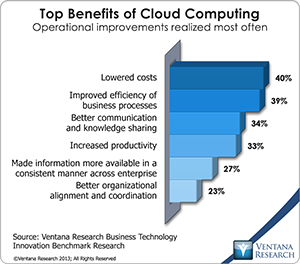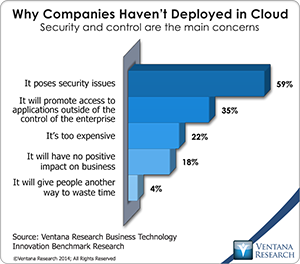It’s widely agreed that cloud computing is a major technology innovation. Many companies use cloud-based systems for specific business functions such as customer service, sales, marketing, finance and human resources. More generally, however, analytics and business intelligence (BI) have not migrated to the cloud as quickly. But now cloud-based data and analytics products are becoming more common. This trend is most popular among technology companies, small and midsize businesses, and departments in larger ones, but there are examples of large companies moving their entire BI environments to the cloud. Our research into big data analytics shows that more than one-fourth of analytics initiatives for companies of all sizes are cloud-based.
 Like other cloud-based applications, cloud analytics offers enhanced scalability and flexibility, affordability and IT staff optimization. Our research shows that in general the top benefits are lowered costs (for 40%), improved efficiency (39%) and better communication and knowledge sharing (34%). Using the cloud, organizations can use a sophisticated IT infrastructure without having to dedicate staff to install and support it. There is no need for comprehensive development and testing because the provider is responsible for maintaining and upgrading the application and the infrastructure. The cloud can also provide flexible infrastructure resources to support “sandbox” testing environments for advanced analytics deployments. Multitenant cloud deployments are more affordable because costs are shared across many companies. When used departmentally, application costs need not be capitalized but instead can be made operational expenditures. Capabilities can be put to use quickly, as vendors develop them, and updates need not disrupt use. Finally, some cloud-based interfaces are more intuitive for end users since they have been designed with the user experience in mind. Regarding cloud technology, our business technology innovation research finds that usability is the most important technology evaluation criterion (for 64% of participants), followed by reliability (54%) and capability (%).
Like other cloud-based applications, cloud analytics offers enhanced scalability and flexibility, affordability and IT staff optimization. Our research shows that in general the top benefits are lowered costs (for 40%), improved efficiency (39%) and better communication and knowledge sharing (34%). Using the cloud, organizations can use a sophisticated IT infrastructure without having to dedicate staff to install and support it. There is no need for comprehensive development and testing because the provider is responsible for maintaining and upgrading the application and the infrastructure. The cloud can also provide flexible infrastructure resources to support “sandbox” testing environments for advanced analytics deployments. Multitenant cloud deployments are more affordable because costs are shared across many companies. When used departmentally, application costs need not be capitalized but instead can be made operational expenditures. Capabilities can be put to use quickly, as vendors develop them, and updates need not disrupt use. Finally, some cloud-based interfaces are more intuitive for end users since they have been designed with the user experience in mind. Regarding cloud technology, our business technology innovation research finds that usability is the most important technology evaluation criterion (for 64% of participants), followed by reliability (54%) and capability (%).
 For analytics and BI specifically, there are still issues holding back adoption. Our research finds that a primary reason companies do not deploy cloud-based applications of any sort are security and compliance issues. For analytics and business intelligence, we can also include data related activities as another reason since cloud-based approaches often require data integration and transmission of sensitive data across an external network along with a range of data preparation. Such issues are especially prevalent for companies that have legacy BI tools using data models that have been distributed across their divisions. Often these organizations have defined their business logic and metrics calculations within the context of these tools. Furthermore, these tools may be integrated with other core applications such as forecasting and planning. To re-architect such data models and metrics calculations is a challenge some companies are reluctant to undertake.
For analytics and BI specifically, there are still issues holding back adoption. Our research finds that a primary reason companies do not deploy cloud-based applications of any sort are security and compliance issues. For analytics and business intelligence, we can also include data related activities as another reason since cloud-based approaches often require data integration and transmission of sensitive data across an external network along with a range of data preparation. Such issues are especially prevalent for companies that have legacy BI tools using data models that have been distributed across their divisions. Often these organizations have defined their business logic and metrics calculations within the context of these tools. Furthermore, these tools may be integrated with other core applications such as forecasting and planning. To re-architect such data models and metrics calculations is a challenge some companies are reluctant to undertake.
In addition, despite widespread use of some types of cloud-based systems, for nontechnical business people discussions of business intelligence in the cloud can be confusing, especially when they involve information integration, the types of analytics to be performed and where the analytic processes will. The first generation of cloud applications focused on end-user processes related to the various lines of business and largely ignored the complexities inherent in information integration and analytics. Organizations can no longer ignore these complexities since doing so exacerbates the challenge of fragmented systems and distributed data. Buyers and architects should understand the benefits of analytics in the cloud and weigh these benefits against the challenges described above.
Our upcoming benchmark research into data and analytics in the cloud will examine the current maturity of this market as well opportunities and barriers to organizational adoption across line of business and IT. It will evaluate cloud-based analytics in the context of trends such as big data, mobile technology and social collaboration as well as location intelligence and predictive analytics. It will consider how cloud computing enables these and other applications and identify leading indicators for adoption of cloud-based analytics. It also will examine how cloud deployment enables large-scale and streaming applications. For example, it will examine real-time processing of vast amounts of data from sensors and other semistructured data (often referred to as the Internet of Things).
It is an exciting time to be studying this particular market as companies consider moving platforms to the cloud. I look forward to receiving any qualified feedback as we move forward to start this important benchmark research. Please get in touch if you have an interest in this area of our research.
Regards,
Tony Cosentino
VP and Research Director











